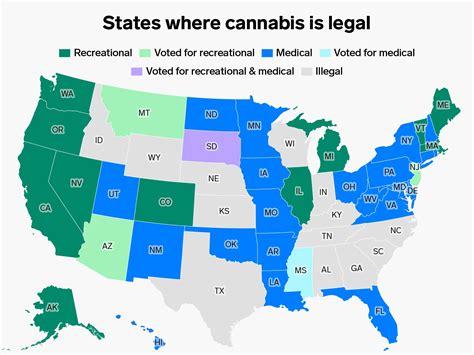
The legal landscape of cannabis, commonly referred to as marijuana, weed, pot, or dope, has evolved significantly across various states in the United States. The cannabis plant contains over 100 compounds, including tetrahydrocannabinol (THC), which is psychoactive, and cannabidiol (CBD), which is non-impairing.
In California, under the Compassionate Use Act of 1996, cannabis was first legalized for medicinal use. As of now, cannabis is legal in California for both medicinal and adult (recreational) use, with strict regulations to ensure safe operation of businesses and contaminant-free products. Adults aged 21 or older can use, carry, and grow cannabis in California, with the stipulation that buying cannabis without a physician’s recommendation or a medical marijuana identification card became legal on January 1, 2018. Medicinal cannabis use is permitted with a current physician’s recommendation. It’s important to note that cities and counties in California may have stricter cannabis laws than the state. For specific local regulations, it’s advisable to visit city or county websitesCalifornia’s cannabis laws – Department of Cannabis Control.
Massachusetts also has legalized the recreational use of marijuana for individuals aged 21 and older following a 2016 vote. The state provides information on marijuana legalization, emphasizing the importance of understanding both state and local lawsMassachusetts law about recreational marijuana | Mass.gov.
New Jersey’s Cannabis Regulatory Enforcement Assistance and Marketplace Modernization (CREAMM) Act permits the legal sale and use of cannabis and cannabis products for residents aged 21 and older. This law has established the recreational cannabis industry in the stateRecreational/Adult-Use Cannabis in New Jersey.
The Centers for Disease Control and Prevention highlights the complexity of studying the health effects of cannabis due to its varying legal status. As more states legalize cannabis for both adult and medicinal use, research into its benefits and risks has increased.
In Boston, Massachusetts, information regarding marijuana legalization is provided by the state and the city, addressing the need for public awareness and resources for individuals who may struggle with marijuana or other substancesMarijuana legalization and the City of Boston | Boston.gov.
At the federal level, the Consolidated Appropriations Act of 2023 has implications for the legal action against states regarding medical marijuana laws, creating a policy gap between federal and state legislationThe Federal Status of Marijuana and the Expanding Policy Gap with States.
Overall, the legal status of cannabis in the United States varies significantly by state, and it is crucial for individuals to be aware of both state and local regulations to ensure compliance. The evolving nature of cannabis laws reflects a shift in societal attitudes and the recognition of the potential therapeutic benefits of cannabis.